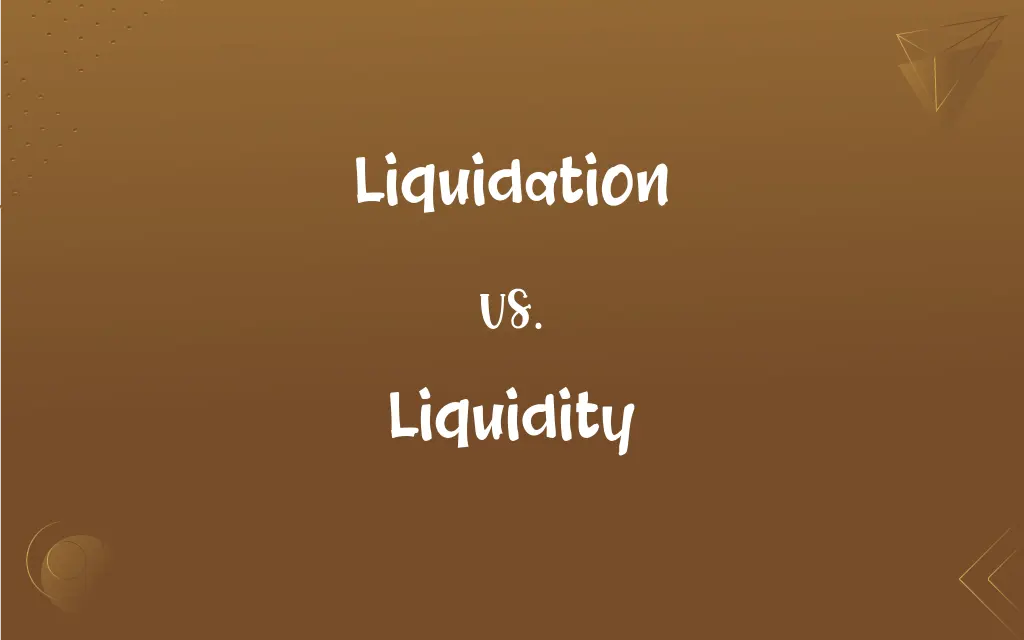Liquidation vs. Liquidity: What's the Difference?
Edited by Janet White || By Harlon Moss || Updated on November 13, 2023
Liquidation is the process of converting assets into cash or settling debts, while liquidity refers to the ease with which assets can be converted into cash without loss in value.

Key Differences
Liquidation is a financial process where a company or entity converts its assets into cash, often to pay off debts. Liquidity refers to the ability of an asset to be quickly converted into cash without significantly affecting its value.
In the context of business closure, liquidation involves selling off all assets to meet financial obligations. Liquidity, conversely, is a characteristic of assets that denotes how quickly and easily they can be sold for cash.
Liquidation can be a sign of financial distress or the end of a business, often occurring during bankruptcy. Liquidity is an indicator of financial health, showing how easily a company can meet short-term liabilities.
The term liquidation is used specifically in the context of winding down operations and settling debts. In contrast, liquidity is a broader concept that applies to the fluidity of assets in normal business operations.
Liquidation may result in the cessation of business activities, as it typically involves dissolving the entity. Liquidity, however, is a desirable attribute in finance, ensuring operational flexibility and financial stability.
ADVERTISEMENT
Comparison Chart
Definition
The process of converting assets to cash or settling debts.
The ease of converting assets into cash without losing value.
Context
Often associated with bankruptcy or closing a business.
A measure of financial health and asset fluidity.
Impact on Business
Usually signifies the end of business operations.
Indicates ability to meet short-term financial obligations.
Timeframe
Often a longer, more complex process.
Relates to immediate or short-term asset conversion.
Overall Implication
Generally negative, indicating financial distress.
Positive, reflecting financial stability and operational flexibility.
ADVERTISEMENT
Liquidation and Liquidity Definitions
Liquidation
The act of dissolving a company by selling its assets.
After declaring bankruptcy, the company entered into liquidation.
Liquidity
The ease of converting assets into cash without loss.
The company's strong liquidity helped it survive financial challenges.
Liquidation
The process of converting a company's assets into cash.
The business underwent liquidation to pay off its creditors.
Liquidity
A measure of how quickly assets can be sold for cash.
Cash is considered the most liquid asset.
Liquidation
The winding down of a company by settling its liabilities.
The store's liquidation sale was due to its imminent closure.
Liquidity
The capacity to meet short-term obligations through assets.
Good liquidity means having funds available when needed.
Liquidation
The final phase of a business ending its operations.
The company's liquidation marked the end of an era in the industry.
Liquidity
The ability to quickly convert assets into cash.
High liquidity is important for meeting unexpected expenses.
Liquidation
Selling off assets to meet financial obligations.
The liquidation of assets was necessary to cover outstanding debts.
Liquidity
The degree to which an asset can be quickly traded.
Stocks are generally liquid assets, easily traded on the market.
Liquidation
To pay off (a debt, claim, or obligation); settle.
Liquidity
The state of being liquid.
Liquidation
To settle the affairs of (a business firm, for example) by determining the liabilities and applying the assets to their discharge.
Liquidity
The quality of being readily convertible into cash
An investment with high liquidity.
Liquidation
To convert (assets) into cash.
Liquidity
Available cash or the capacity to obtain it on demand
A bank that is increasing its liquidity by shortening the average term of its loans.
Liquidity
(finance) The degree of which something is in high supply and demand, making it easily convertible to cash
Liquidity
(uncountable) The state or property of being liquid.
Liquidity
An asset's property of being able to be sold without affecting its value; the degree to which it can be easily converted into cash.
Some stocks are traded so rarely that they lack liquidity.
Liquidity
(finance) Availability of cash over short term: ability to service short-term debt.
Liquidity
The state or quality of being liquid.
Liquidity
The state in which a substance exhibits a characteristic readiness to flow with little or no tendency to disperse and relatively high incompressibility
Liquidity
The property of flowing easily
Liquidity
Being in cash or easily convertible to cash; debt paying ability
FAQs
What triggers liquidation in a company?
Financial distress, bankruptcy, or a decision to cease operations.
Is liquidation always involuntary?
No, it can be a strategic choice for restructuring or exiting a business.
Why is liquidity important in finance?
It indicates the ability to meet short-term liabilities and handle emergencies.
Can an individual go through liquidation?
Yes, in the form of personal bankruptcy and asset liquidation.
What happens to shareholders during liquidation?
They may lose their investment if debts exceed asset values.
Does liquidation affect company employees?
Yes, it often leads to job losses and termination of employment.
Can a business operate during liquidation?
Usually not, as liquidation involves winding down operations.
What are examples of liquid assets?
Cash, stocks, and government bonds are typical liquid assets.
How does liquidity affect investments?
High liquidity allows for easier buying and selling of investments.
Are all company assets sold during liquidation?
Typically, yes, to pay off debts and obligations.
What role do creditors play in liquidation?
Creditors are paid from the proceeds of the liquidated assets.
How is liquidity measured?
Through ratios like the current ratio or quick ratio.
How does high liquidity benefit a company?
It provides flexibility and resilience in financial management.
How does market volatility affect liquidity?
It can impact the ease and speed of converting assets into cash.
Can a company recover from liquidation?
Recovery is not typical, as liquidation usually means the end of the business.
What is the impact of low liquidity?
Difficulty in meeting short-term obligations and potential financial strain.
Is liquidation the same as bankruptcy?
Bankruptcy can lead to liquidation, but they are not synonymous.
Is real estate considered a liquid asset?
Generally, no, due to the time it takes to sell property.
Can liquidity vary over time?
Yes, depending on financial conditions and asset management.
Who oversees the liquidation process?
A liquidator, appointed to manage the process and asset distribution.
About Author
Written by
Harlon MossHarlon is a seasoned quality moderator and accomplished content writer for Difference Wiki. An alumnus of the prestigious University of California, he earned his degree in Computer Science. Leveraging his academic background, Harlon brings a meticulous and informed perspective to his work, ensuring content accuracy and excellence.
Edited by
Janet WhiteJanet White has been an esteemed writer and blogger for Difference Wiki. Holding a Master's degree in Science and Medical Journalism from the prestigious Boston University, she has consistently demonstrated her expertise and passion for her field. When she's not immersed in her work, Janet relishes her time exercising, delving into a good book, and cherishing moments with friends and family.































































